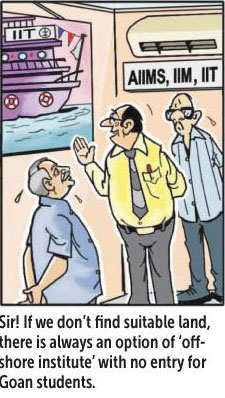15 Dec 2016 | 07:02am IST
Imposing committed patriotism
National flag and national anthem represents the soul and spirit of the nation.
Citizens must honour national symbols but whipping up sentiments by chest thumping will only bring what could be called committed patriotism. Indians love their motherland. Their fervour for the Indian cricket team is an index of their emotional bond. At the local level ‘Força Goa’ had become the greatest brand.
The recent interim order of the Supreme Court on standing up for the national anthem before screening of films has evoked strong reactions. The court held “citizens are duty bound to show respect to the national anthem which is the symbol of constitutional patriotism”. Soli Sorabjee, ex-AG of India during the NDA regime under A.B. Vajpayee has dubbed the order as ‘judicial authoritarianism’. Swaminathan Aiyar calls it an ‘unwarranted example of ultra nationalism’. I read somewhere that the court has stolen a march over right wing groups.
Coming at a time when populist nationalism is redrawing new boundaries in the ‘liberal’ and the ‘right’ world, this order is also welcomed by the right wingers.
In 1986 a two-judge bench of the Supreme Court in the Bijoe Emmanuel v/s The State of Kerala upheld the right of Jehovah’s witnesses, constituting a religious denomination, not to ‘sing’ the national anthem on the ground of genuine conscientious religious objection. That judgment evoked a strong reaction and the then Prime Minister declared that the government would use legal and constitutional means to undo the damage. A writ petition seeking reconsideration by a constitutional bench did not find favour and Bijoe Emmanuel became a celebration level of our tolerance and diversity.
In 1986 the issue was ‘not standing up’ but ‘not singing’ the national anthem. The US District Court of Arizona (Sheldon v/s Fannin), in the matter of refusal to stand up when the national anthem was sung stated “this refusal to participate, even to the extent of standing, without singing is said to have been dictated by their religious beliefs”. In India the question was whether they were protected by our constitution as much as the protection they have in America. It is in that context that our Supreme Court ruled “Art. 25 is an article of faith in the constitution, incorporated in recognition of the principle, that the real test of true democracy is the ability of even an insignificant minority to find its identity under the country’s constitution”. Honour for the nation and respect for national symbols cannot be extracted on peril of punishment. It is certainly a citizen’s duty to respect the national flag and the national anthem which represents the soul and spirit of the nation. The respect ought to be evolved by eulogizing the rich heritage, history and tradition of the nation. Use of force may work in a counter-productive manner. History tells us that no amount of force can be used to build a patriotic citizenry. In America at the height of the Vietnam war the anti-war lobby started burning the US flags. They were only attacking the fervour in favour of war, built through patriotic and nationalistic sentiments, in an attempt to suppress all forms of dissent against the war. The states’ laws, making flag burning a criminal offence were struck down by the Supreme Court (Texas V/s Johnson) on the ground of freedom of expression secured by the first amendment to the US constitution. Thereafter, even the federal law called the Flag Protection Act 1968 passed by the US Congress was struck down (United States v/s Eichman). USA has not been in a position to subject flag desecration, to freedom of expression by a constitutional amendment.
In our country the court verdicts reflect the socio-political atmosphere in the country. The 1975 emergency period saw our highest court, not standing by the citizens at a time when they required it’s help. After emergency in a very liberal atmosphere, the country saw flowering of dissent. We had a number of judgments providing a new dimension to life and liberty. 2011 to 2014 were the years of accountability and in the atmosphere of holding the government accountable, came the verdicts on 2G, CWG, Coalgate etc. There is a perception that the highest court gets swayed not by constitutional values but by the socio- political atmosphere or by the government of the day.
We are at a time in history where politics and society is divided on Nationalism/Patriotism lines. Populist nationalism is now the defining characteristic of our times. Even a economic view on Prime Minister’s demonetization move, puts one on either side of the nationalist line depending upon one’s view in the matter. Similarly the Supreme Court interim order on the national anthem has been welcomed and attacked depending upon which side of the political spectrum one is.
The interim order on the national anthem came in an atmosphere where dissent is taken to be against the nationalist line. Vigilante groups have already started whipping up sentiments and started going overboard, attacking those who do not stand up. We cannot lose track of the fact that the respect for national flag and national anthem is in the same chapter which also seeks to promote scientific temper, humanism, spirit of enquiry and reform. That is the flavor of our constitution.
A citizen’s patriotism cannot be tested by making him stand up at purely entertainment places when even court proceedings do not start with the ‘Rashtra geet’. Rogues cannot be treated as patriots just because they put up that façade. Do not forget, the ‘patriot’ (Chagan Bhujbal) who reintroduced the national anthem in cinema halls is in now in jail on charges of corruption.
(The writer is a practicing advocate, senior faculty in law and political analyst)
